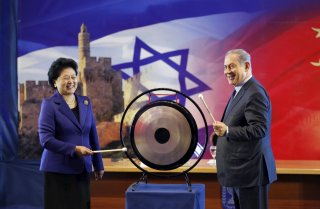Ousting the Middle Kingdom from Zion: A U.S. Strategy toward Chinese Influence in Israel
The United States has a deep interest in stopping Israel from falling any further into China’s orbit. Doing so requires mobilizing non-military tools of diplomacy, including some coercive ones, to bring Israel around to the U.S. position.
Should all else fail and Israel grow ever more in thrall to China, the United States will have to start making threats. Pompeo’s public warning only scratches the surface. U.S. government officials could tell Israeli counterparts outright that they face a choice between America and China—a choice between a free society that cares about Israeli concerns and a closed one that could not care less about them. As Michael Rubin puts it, Jerusalem can either “support the camp of democracies struggling against an authoritarian resurgence or, through its trade policies, become like Recep Tayyip Erdoğan’s Turkey and seek to profit off autocracies who endanger liberal societies.” Deciding on the latter could incur unpleasant consequences. Washington could threaten to re-negotiate or terminate the U.S.-Israel free trade agreement, stop vetoing anti-Israel resolutions at the United Nations, or even put a moratorium on defense cooperation. It would not be in America’s interests to follow through on any of those threats, but making them would give Israel even more of an incentive to ditch China. Despite the hope that things won’t come to this, Washington should be prepared if less coercive tools do not work.
ROBUST DIPLOMATIC engagement of our Israeli friends, coupled with the threat of economic, political, and military repercussions, is the best formula to keep the U.S.-Israel alliance strong and pare back the PRC’s growing influence in Jerusalem. It’s not clear that Jerusalem has let this message sink in. The fact that the Trump administration, probably the most pro-Israel administration ever, voiced its displeasure on multiple occasions with Sino-Israeli ties suggests that the country is dragging its feet when it comes to standing up to China. Washington needs to rally its allies against China. Israel should be among them.
Daniel J. Samet is a Graduate Fellow at the Clements Center for National Security at the University of Texas at Austin, where his research focuses on U.S. policy toward the Middle East.
Image: Reuters.

